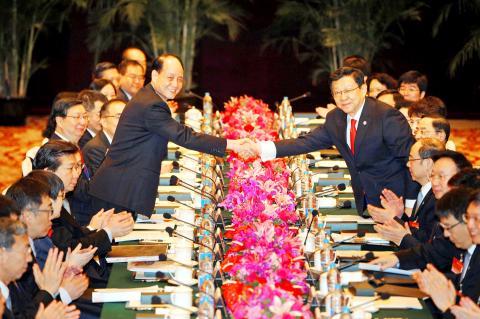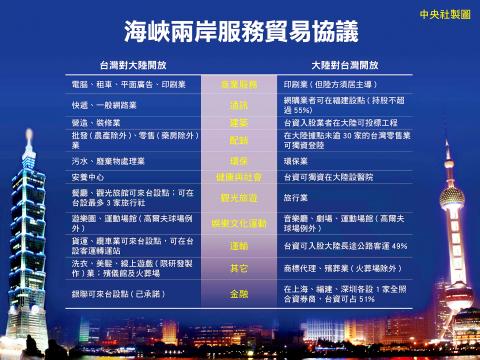The Straits Exchange Foundation and the Association for Relations Across the Taiwan Straits (ARATS) yesterday signed a cross-strait service trade agreement in Shanghai during the ninth round of cross-strait talks, opening the service sectors on both sides to further cross-strait exchanges.
Under the pact, which includes four chapters and 24 articles, 64 Taiwanese industries will be opened to Chinese investment, while China will open up 80 industries to Taiwan.
The Taiwanese industries include transportation, tourism and traditional Chinese medicine, while China will open up its finance, retail, electronics, publishing and travel sectors.

Photo: CNA
Under the agreement, Chinese investors will be allowed to open hotels in Taiwan.
Taiwan will also allow Chinese travel agencies to establish a maximum of three branches in the country and provide services to Taiwanese. However, they will not be allowed to accommodate any foreign tourists, including Chinese.
Taiwanese investors will be allowed to set up travel agencies in China, as well as open restaurants or hotels.

Photo: CNA
Chinese companies will be allowed to open beauty parlors or hair salons in Taiwan, but would only be allowed to employ Taiwanese.
While China will open its publishing industry to Taiwanese investment, Taiwan will allow Chinese companies to invest in Taiwanese businesses in the printing service industry, with a maximum of 50 percent stock ownership.
On financial services, Taiwanese companies will be allowed to invest security companies in Shanghai, in Shenzhen and Chinese-controlled Fujian Province.
In signing the pact, foundation Chairman Lin Join-sane (林中森) and ARATS Chairman Chen Deming (陳德銘) both lauded the agreement for deepening cross-strait exchanges in the service sector.
Lin said 80 percent of the deal opens the two sides’ service sectors to the same or greater degree as the Closer Economic Partnership Arrangement (CEPA) that was signed between Hong Kong and China in 2003, with 90 percent of financial services covered in the cross-strait agreement opened, just like in the CEPA.
The cross-strait service trade agreement is a major follow-up to the Economic Cooperation Framework Agreement (ECFA) and the General Agreement on Trade in Services under the WTO.
“The service trade agreement is a pact that benefits related sectors across the Taiwan Strait and promotes the interests of the public on both sides. It will result in a win-win situation for both sides,” Lin said.
After signing the pact, Taiwan and China cannot revise or cancel the agreement within the next three years.
The two sides will hold an annual meeting to review the implementation of the pact.
The agreement also includes an emergency negotiation mechanism, which gives related industries from each side the right to demand negotiations and seek solutions if the agreement negatively affects their businesses sectors.

Intelligence agents have recorded 510,000 instances of “controversial information” being spread online by the Chinese Communist Party (CCP) so far this year, the National Security Bureau (NSB) said in a report yesterday, as it warned of artificial intelligence (AI) being employed to generate destabilizing misinformation. The bureau submitted a written report to the Legislative Yuan in preparation for National Security Bureau Director-General Tsai Ming-yen’s (蔡明彥) appearance before the Foreign Affairs and National Defense Committee today. The CCP has been using cognitive warfare to divide Taiwanese society by commenting on controversial issues such as Taiwan Semiconductor Manufacturing Co’s (TSMC, 台積電) investments in the

HELPING HAND: The steering committee of the National Stabilization Fund is expected to hold a meeting to discuss how and when to utilize the fund to help buffer the sell-off The TAIEX plunged 2,065.87 points, or 9.7 percent, to close at 19,232.35 yesterday, the highest single-day percentage loss on record, as investors braced for US President Donald Trump’s tariffs after an extended holiday weekend. Amid the pessimistic atmosphere, 945 listed companies led by large-cap stocks — including Taiwan Semiconductor Manufacturing Co (TSMC, 台積電), Hon Hai Precision Industry Co (鴻海精密) and Largan Precision Co (大立光) — fell by the daily maximum of 10 percent at the close, Taiwan Stock Exchange data showed. The number of listed companies ending limit-down set a new record, the exchange said. The TAIEX plunged by daily maxiumu in just

‘COMPREHENSIVE PLAN’: Lin Chia-lung said that the government was ready to talk about a variety of issues, including investment in and purchases from the US The National Stabilization Fund (NSF) yesterday announced that it would step in to staunch stock market losses for the ninth time in the nation’s history. An NSF board meeting, originally scheduled for Monday next week, was moved to yesterday after stocks plummeted in the wake of US President Donald Trump’s announcement of 32 percent tariffs on Taiwan on Wednesday last week. Board members voted to support the stock market with the NT$500 billion (US$15.15 billion) fund, with injections of funds to begin as soon as today. The NSF in 2000 injected NT$120 billion to stabilize stocks, the most ever. The lowest amount it

INVESTIGATION: The case is the latest instance of a DPP figure being implicated in an espionage network accused of allegedly leaking information to Chinese intelligence Democratic Progressive Party (DPP) member Ho Jen-chieh (何仁傑) was detained and held incommunicado yesterday on suspicion of spying for China during his tenure as assistant to then-minister of foreign affairs Joseph Wu (吳釗燮). The Taipei District Prosecutors’ Office said Ho was implicated during its investigation into alleged spying activities by former Presidential Office consultant Wu Shang-yu (吳尚雨). Prosecutors said there is reason to believe Ho breached the National Security Act (國家安全法) by leaking classified Ministry of Foreign Affairs information to Chinese intelligence. Following interrogation, prosecutors petitioned the Taipei District Court to detain Ho, citing concerns over potential collusion or tampering of evidence. The